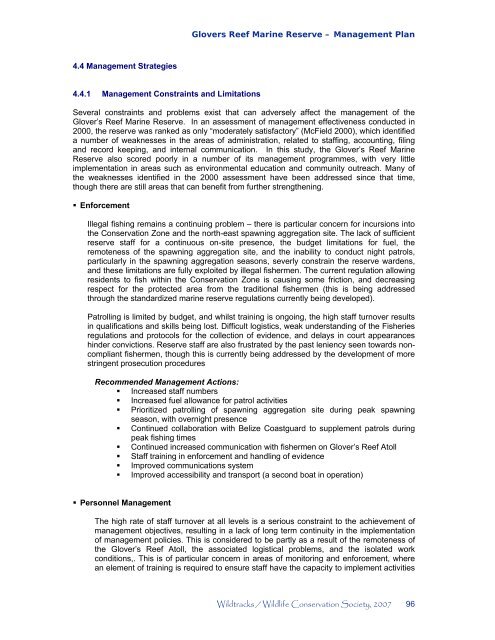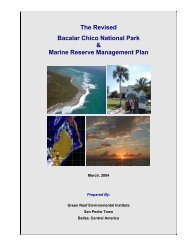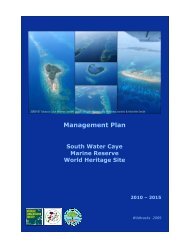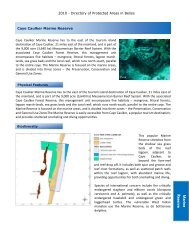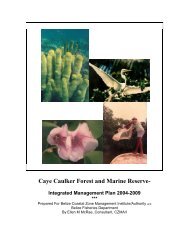Management Plan - Glover's Reef Marine Reserve
Management Plan - Glover's Reef Marine Reserve
Management Plan - Glover's Reef Marine Reserve
You also want an ePaper? Increase the reach of your titles
YUMPU automatically turns print PDFs into web optimized ePapers that Google loves.
4.4 <strong>Management</strong> Strategies<br />
4.4.1 <strong>Management</strong> Constraints and Limitations<br />
Glovers <strong>Reef</strong> <strong>Marine</strong> <strong>Reserve</strong> – <strong>Management</strong> <strong>Plan</strong><br />
Several constraints and problems exist that can adversely affect the management of the<br />
Glover’s <strong>Reef</strong> <strong>Marine</strong> <strong>Reserve</strong>. In an assessment of management effectiveness conducted in<br />
2000, the reserve was ranked as only “moderately satisfactory” (McField 2000), which identified<br />
a number of weaknesses in the areas of administration, related to staffing, accounting, filing<br />
and record keeping, and internal communication. In this study, the Glover’s <strong>Reef</strong> <strong>Marine</strong><br />
<strong>Reserve</strong> also scored poorly in a number of its management programmes, with very little<br />
implementation in areas such as environmental education and community outreach. Many of<br />
the weaknesses identified in the 2000 assessment have been addressed since that time,<br />
though there are still areas that can benefit from further strengthening.<br />
Enforcement<br />
Illegal fishing remains a continuing problem – there is particular concern for incursions into<br />
the Conservation Zone and the north-east spawning aggregation site. The lack of sufficient<br />
reserve staff for a continuous on-site presence, the budget limitations for fuel, the<br />
remoteness of the spawning aggregation site, and the inability to conduct night patrols,<br />
particularly in the spawning aggregation seasons, severly constrain the reserve wardens,<br />
and these limitations are fully exploited by illegal fishermen. The current regulation allowing<br />
residents to fish within the Conservation Zone is causing some friction, and decreasing<br />
respect for the protected area from the traditional fishermen (this is being addressed<br />
through the standardized marine reserve regulations currently being developed).<br />
Patrolling is limited by budget, and whilst training is ongoing, the high staff turnover results<br />
in qualifications and skills being lost. Difficult logistics, weak understanding of the Fisheries<br />
regulations and protocols for the collection of evidence, and delays in court appearances<br />
hinder convictions. <strong>Reserve</strong> staff are also frustrated by the past leniency seen towards noncompliant<br />
fishermen, though this is currently being addressed by the development of more<br />
stringent prosecution procedures<br />
Recommended <strong>Management</strong> Actions:<br />
Increased staff numbers<br />
Increased fuel allowance for patrol activities<br />
Prioritized patrolling of spawning aggregation site during peak spawning<br />
season, with overnight presence<br />
Continued collaboration with Belize Coastguard to supplement patrols during<br />
peak fishing times<br />
Continued increased communication with fishermen on Glover’s <strong>Reef</strong> Atoll<br />
Staff training in enforcement and handling of evidence<br />
Improved communications system<br />
Improved accessibility and transport (a second boat in operation)<br />
Personnel <strong>Management</strong><br />
The high rate of staff turnover at all levels is a serious constraint to the achievement of<br />
management objectives, resulting in a lack of long term continuity in the implementation<br />
of management policies. This is considered to be partly as a result of the remoteness of<br />
the Glover’s <strong>Reef</strong> Atoll, the associated logistical problems, and the isolated work<br />
conditions,. This is of particular concern in areas of monitoring and enforcement, where<br />
an element of training is required to ensure staff have the capacity to implement activities<br />
Wildtracks / Wildlife Conservation Society, 2007 96


